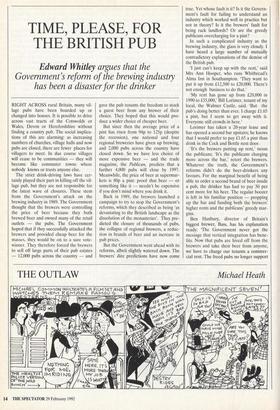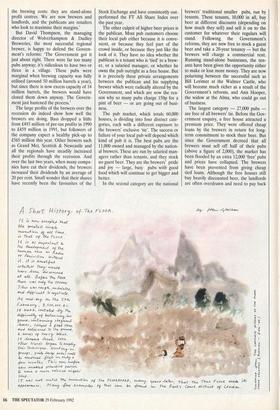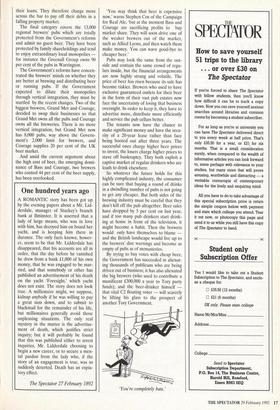TIME, PLEASE, FOR THE BRITISH PUB
Edward Whitley argues that the
Government's reform of the brewing industry has been a disaster for the drinker
RIGHT ACROSS rural Britain, many vil- lage pubs have been boarded up or changed into houses. It is possible to drive across vast tracts of the Cotswolds or Wales, Devon or Herefordshire without finding a country pub. The social implica- tions of this are alarming: as increasing numbers of churches, village halls and now pubs are closed, there are fewer places for villagers to meet. In due course villages will cease to be communities — they will become like commuter towns where nobody knows or trusts anyone else.
The strict drink-driving laws have cer- tainly played their part in killing off the vil- lage pub, but they are not responsible for the latest wave of closures. These stem from the Government's attack on the brewing industry in 1989. The Government thought that the brewers were controlling the price of beer because they both brewed beer and owned many of the retail outlets — the pubs. The Government hoped that if they successfully attacked the brewers and provided cheap beer for the masses, they would be on to a sure vote- winner. They therefore forced the brewers to sell off large parts of their pub estates — 12,000 pubs across the country — and gave the pub tenants the freedom to stock a guest beer from any brewer of their choice. They hoped that this would pro- duce a wider choice of cheaper beer.
But since then the average price of a pint has risen from 94p to 125p (despite the recession), one national and four regional breweries have given up brewing, and 2,000 pubs across the country have closed down. So we have less choice of more expensive beer — and the trade magazine, the Publican, predicts that a further 4,000 pubs will close by 1997. Meanwhile, the price of beer at supermar- kets is 80p a pint: proof that beer — or something like it — needn't be expensive if you don't mind where you drink it.
Back in 1989, the brewers launched a campaign to try to stop the Government's reforms, which they described as being 'as devastating to the British landscape as the dissolution of the monasteries'. They pre- dicted the closure of thousands of pubs, the collapse of regional brewers, a reduc- tion in brands of beer and an increase in pub prices.
But the Government went ahead with its reforms, albeit slightly watered down. The brewers' dire predictions have now come true. Yet whose fault is it? Is it the Govern- ment's fault for failing to understand an industry which worked well in practice but not in theory? Is it the brewers' fault for being rack landlords? Or are the greedy publicans overcharging for a pint?
In such a complicated industry as the brewing industry, the glass is very cloudy. I have heard a large number of mutually contradictory explanations of the demise of the British pub.
'I just can't keep up with the rent,' said Mrs Ann Hooper, who runs Whitbread's Alma Inn in Southampton. 'They want to put it up from £12,500 to £20,000. There's not enough business to do that.'
'My rent has gone up from £20,000 in 1990 to £35,000; Bill Lorimer, tenant of my local, the Walmer Castle, said. 'But the pub's doing better than ever. I charge £1.65 a pint, but I seem to get away with it. Everyone still crowds in here.'
Lorimer has taken a 20-year lease and has opened a second bar upstairs; he knows that I would prefer to pay £1.65 a pint than drink in the Cock and Bottle next door.
'It's the brewers putting up rent,' moan the publicans; 'It's the publicans charging more across the bar,' retort the brewers. Whatever the truth, the Government's reforms didn't do the beer-drinkers any favours. For the marginal benefit of being able to order a second brand of beer inside a pub, the drinker has had to pay 30 per cent more for his beer. The regular boozer is left in his familiar position — propping up the bar and funding both the brewers' higher rents and the publicans' greedy mar- gins.
Ben Hanbury, director of Britain's biggest brewer, Bass, has his explanation ready: 'The Government never got the message that vertical integration has bene- fits. Now that pubs are hived off from the brewers and take their beer from anyone, we have to charge our tenants a commer- cial rent. The freed pubs no longer support the brewing costs: they are stand-alone profit centres. We are now brewers and landlords, and the publicans are retailers who look to maximise their margins.'
But David Thompson, the managing director of Wolverhampton & Dudley Breweries, the most successful regional brewer, is happy to defend the Govern- ment's reforms: 'The Government got it just about right. There were far too many pubs anyway; it's ridiculous to have two or three in a village. These pubs were marginal when brewing capacity was fully utilised (around 50 million barrels a year), but since there is now excess capacity of 14 million barrels, the brewers would have closed them down anyway. The Govern- ment just hastened the process.'
The large profits of the brewers over the recession do indeed show how well the brewers are doing. Bass dropped a little from £493 million of pre-tax profits in 1990 to £459 million in 1991, but followers of the company expect a healthy pick-up to £565 million this year. Other brewers such as Grand Met, Scottish & Newcastle and all the regionals have steadily increased their profits through the recession. And over the last two years, when many compa- nies have cut their dividends, the brewers increased their dividends by an average of 20 per cent. Small wonder that their shares have recently been the favourites of the Stock Exchange and have consistently out- performed the FT All Share Index over the past year.
The other culprit of higher beer prices is the publican. Most pub customers choose their local pub either because it is conve- nient, or because they feel part of the crowd inside, or because they just like the look of it. They have no idea whether the publican is a tenant who is 'tied' to a brew- er, or a salaried manager, or whether he owns the pub outright as a free house. But it is precisely these private arrangements between the publican and his supplying brewer which were radically altered by the Government, and which are now the rea- son why so many pubs charge 150p for a pint of beer — or are going out of busi- ness.
The pub market, which totals 60,000 houses, is dividing into four distinct cate- gories, each with a different exposure to the brewers' exclusive 'tie'. The success or failure of your local pub will depend which kind of pub it is. The best pubs are the 11,000 owned and managed by the nation- al brewers. These are run by salaried man- agers rather than tenants, and they stock no guest beer. They are the brewers' pride and joy — large, busy pubs with' good food which will continue to get bigger and better.
In the second category are the national brewers' traditional smaller pubs, run by tenants. These tenants, 10,000 in all, buy beer at different discounts (depending on how much they sell) and sell it on to the customer for whatever their regulars will stand. Following the Government's reforms, they are now free to stock a guest beer and take a 20-year tenancy — but the brewers will charge a commercial rent. Running stand-alone businesses, the ten- ants have been given the opportunity either to make or lose more money. They are now polarising between the successful such as Bill Lorimer at the Walmer Castle, who will become much richer as a result of the Government's reforms, and Ann Hooper, the widow at the Alma, who could go out of business.
The largest category — 27,000 pubs — are free of all brewers' tie. Before the Gov- ernment enquiry, a free house attracted a premium price. They were offered cheap loans by the brewers in return for long- term commitment to stock their beer. But since the Government decreed that all brewers must sell off half of their pubs (above a figure of 2,000), the market has been flooded by an extra 12,000 'free' pubs and prices have collapsed. The brewers have been prevented from giving cheap tied loans. Although the free houses still buy heavily discounted beer, the landlords are often overdrawn and need to pay back their loans. They therefore charge more across the bar to pay off their debts in a falling property market.
The final category covers the 13,000 regional brewers' pubs which are totally protected from the Government's reforms and admit no guest beer. They have been protected by family shareholdings and tend to enjoy extraordinary local monopolies — for instance the Greenall Group owns 90 per cent of the pubs in Warrington.
The Government's reforms have concen- trated the brewers' minds on whether they are better at brewing and distributing beer or running pubs. If the Government expected to dilute their monopolies through vertical integration, they must be startled by the recent changes. Two of the biggest brewers, Grand Met and Courage, decided to swap their businesses so that Grand Met owns all the pubs and Courage owns all the breweries. There is no more vertical integration, but Grand Met now has 8,000 pubs, way above the Govern- ment's 2,000 limit for brewers, and Courage supplies 20 per cent of the UK beer market.
And amid the current argument about the high cost of beer, the emerging domi- nance of Bass and Courage, two brewers who control 44 per cent of the beer supply, has been overlooked. 'You may think that beer is expensive now,' warns Stephen Cox of the Campaign for Real Ale, 'but at the moment Bass and Courage are sacrificing profits to buy market share. They will soon drive one of the weaker brewers out of the market, such as Allied Lyons, and then watch them make money. You can wave good-bye to cheaper beer.'
Pubs may look the same from the out- side and contain the same crowd of regu- lars inside, but the financial arrangements are now highly strung and volatile. The price of beer has risen because its sale has become riskier. Brewers who used to have exclusive guaranteed outlets for their beer in the form of their vast pub estates now face the uncertainty of losing that business overnight. In order to keep it, they have to advertise more, distribute more efficiently and service the pub cellars better.
The tenants now have the chance to make significant money and have the secu- rity of a 20-year lease rather than face being booted out after three years. The successful ones charge higher beer prices to invest, the losers charge higher prices to stave off bankruptcy. They both exploit a captive market of regular drinkers who are loath to drink elsewhere.
So whatever the future holds for this highly complicated industry, the consumer can be sure that buying a round of drinks in a dwindling number of pubs is not going to get any cheaper. But both sides of the brewing industry must be careful that they don't kill off the pub altogether. Beer sales have dropped by 5 per cent on last year, and if too many pub drinkers start drink- ing at home in front of the television, it might become a habit. Then the brewers would only have themselves to blame — and the British landscape would live up to the brewers' dire warnings and become as empty of pubs as of monasteries.
By trying to buy votes with cheap beer, the Government has succeeded in alienat- ing thousands of publicans who are being driven out of business; it has also alienated the big brewers (who used to contribute a munificent £300,000 a year to Tory party funds); and the beer-drinker himself — that vital C2 floating voter — will scarcely be lifting his glass to the prospect of another Tory Government.
'You're completely bats.'




















































 Previous page
Previous page